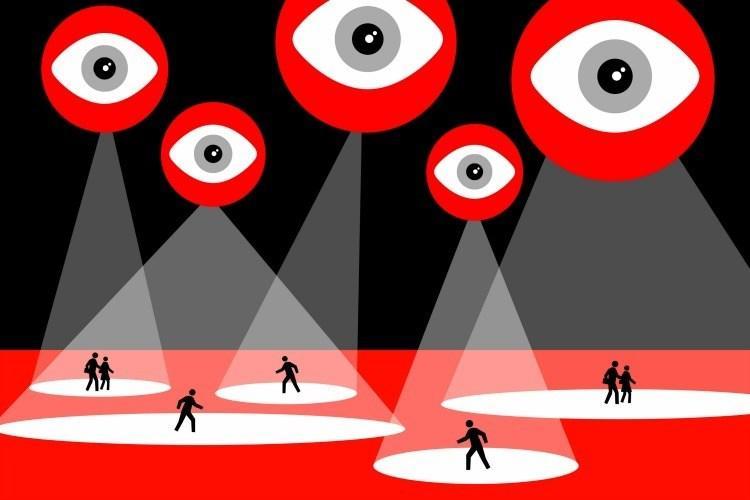9/11 & The Road To America's Orwellian Hell
Next week will be the 18th anniversary of the 9/11 attacks. Politicians and bureaucrats wasted no time after that carnage to unleash the Surveillance State on average Americans, treating every person like a terrorist suspect. Since the government failed to protect the public, Americans somehow forfeited their constitutional right to privacy. Despite heroic efforts by former NSA staffer Edward Snowden and a host of activists and freedom fighters, the government continues ravaging American privacy.
Two of the largest leaps towards “1984” began in 2002. Though neither the Justice Department’s Operation TIPS nor the Pentagon’s Total Information Awareness program was brought to completion, parcels and precedents from each program have profoundly influenced subsequent federal policies.
In July 2002, the Justice Department unveiled plans for Operation TIPS — the Terrorism Information and Prevention System. According to the Justice Department website, TIPS would be “a nationwide program giving millions of American truckers, letter carriers, train conductors, ship captains, utility employees, and others a formal way to report suspicious terrorist activity.” TIPSters would be people who, “in the daily course of their work, are in a unique position to serve as extra eyes and ears for law enforcement.” The feds aimed to recruit people in jobs that “make them uniquely well positioned to understand the ordinary course of business in the area they serve, and to identify things that are out of the ordinary.” Homeland Security director Tom Ridge said that observers in certain occupations “might pick up a break in the certain rhythm or pattern of a community.” The feds planned to enlist as many as 10 million people to watch other people’s “rhythms.”
The Justice Department provided no definition of “suspicious behavior” to guide vigilantes. As the public began to focus on the program’s sweep, opposition surfaced; even the U.S. Postal Service briefly balked at participating in the program. Director Ridge insisted that TIPS “is not a government intrusion.” He declared, “The last thing we want is Americans spying on Americans. That’s just not what the president is all about, and not what the TIPS program is all about.” Apparently, as long as the Bush administration did not announce plans to compel people to testify about the peccadilloes of their neighbors and customers, TIPS was a certified freedom-friendly program.
When Attorney General John Ashcroft was cross-examined by Sen. Patrick Leahy (D-Vt.) on TIPS at a Judiciary Committee hearing on July 25, he insisted that “the TIPS program is something requested by industry to allow them to talk about anomalies that they encounter.”But, when George W. Bush first announced the program, he portrayed it as an administration initiative. Did thousands of Teamsters Union members petition 1600 Pennsylvania Avenue over “anomalies”? Senator Leahy asked whether reports to the TIPS hotline would become part of a federal database with millions of unsubstantiated allegations against American citizens. Ashcroft told Leahy, “I have recommended that there would be none, and I’ve been given assurance that the TIPS program would not maintain a database.” But Ashcroft could not reveal which federal official had given him the assurance.
The ACLU’s Laura Murphy observed, “This is a program where people’s activities, statements, posters in their windows or on their walls, nationality, and religious practices will be reported by untrained individuals without any relationship to criminal activity.” San Diego law professor Marjorie Cohn observed, “Operation TIPS … will encourage neighbors to snitch on neighbors and won’t distinguish between real and fabricated tips. Anyone with a grudge or vendetta against another can provide false information to the government, which will then enter the national database.”
On August 9, the Justice Department announced it was fine-tuning TIPS, abandoning any “plan to ask thousands of mail carriers, utility workers, and others with access to private homes to report suspected terrorist activity,” the Washington Post reported. People who had enlisted to be TIPSters received an email notice from Uncle Sam that “only those who work in the trucking, maritime, shipping, and mass transit industries will be eligible to participate in this information referral service.” But the Justice Department continued refusing to disclose to the Senate Judiciary Committee who would have access to the TIPS reports.
After the proposal created a fierce backlash across the political board, Congress passed an amendment blocking its creation. House Majority Leader Richard Armey (R-Tex.) attached an amendment to homeland security legislation that declared, “Any and all activities of the federal government to implement the proposed component program of the Citizen Corps known as Operation TIPS are hereby prohibited.” But the Bush administration and later the Obama administration pursued the same information roundup with federally funded fusion centers that encouraged people to file “suspicious activity reports” for a wide array of innocuous behavior — reports that are dumped into secret federal databases that can vex innocent citizens in perpetuity.
Operation TIPS illustrated how the momentum of intrusion spurred government to propose programs that it never would have attempted before 9/11. If Bush had proposed in August 2001 to recruit 10 million Americans to report any of their neighbors they suspected of acting unusual or being potential troublemakers, the public might have concluded the president had gone berserk.
Total Information Awareness: 300 million dossiers
The USA PATRIOT Act created a new Information Office in the Pentagon’s Defense Advanced Research Projects Agency (DARPA). In January 2002, the White House chose retired admiral John Poindexter to head the new office. White House spokesman Ari Fleischer explained, “Admiral Poindexter is somebody who this administration thinks is an outstanding American, an outstanding citizen, who has done a very good job in what he has done for our country, serving the military.” Cynics kvetched about Poindexter’s five felony convictions for false testimony to Congress and destruction of evidence during the investigation of the Iran-Contra arms-for-hostages exchange. Poindexter’s convictions were overturned by a federal appeals court, which cited the immunity Congress granted his testimony.
Poindexter committed the new Pentagon office to achieving Total Information Awareness (TIA). TIA’s mission is “to detect, classify and identify foreign terrorists — and decipher their plans — and thereby enable the U.S. to take timely action to successfully preempt and defeat terrorist acts,” according to DARPA. According to Undersecretary of Defense Pete Aldridge, TIA would seek to discover “connections between transactions — such as passports; visas; work permits; driver’s licenses; credit cards; airline tickets; rental cars; gun purchases; chemical purchases — and events — such as arrests or suspicious activities and so forth.” Aldridge agreed that every phone call a person made or received could be entered into the database. With “voice recognition” software, the actual text of the call could also go onto a permanent record.
TIA would also strive to achieve “Human Identification at a Distance” (HumanID), including “Face Recognition,” “Iris Recognition,” and “Gait Recognition.” The Pentagon issued a request for proposals to develop an “odor recognition” surveillance system that would help the feds identify people by their sweat or urine — potentially creating a wealth of new job opportunities for deviants.
TIA’s goal was to stockpile as much information as possible about everyone on Earth — thereby allowing government to protect everyone from everything. New York Times columnist William Safire captured the sweep of the new surveillance system: “Every purchase you make with a credit card, every magazine subscription you buy and medical prescription you fill, every Web site you visit and e-mail you send or receive, every academic grade you receive, every bank deposit you make, every trip you book, and every event you attend — all these transactions and communications will go into what the Defense Department describes as ‘a virtual, centralized grand database.’” Columnist Ted Rall noted that the feds would even scan “veterinary records. The TIA believes that knowing if and when Fluffy got spayed — and whether your son stopped torturing Fluffy after you put him on Ritalin — will help the military stop terrorists before they strike.”
Phil Kent, president of the Southeastern Legal Foundation, an Atlanta-based public-interest law firm, warned that TIA was “the most sweeping threat to civil liberties since the Japanese-American internment.” The ACLU’s Jay Stanley labeled TIA “the mother of all privacy invasions. It would amount to a picture of your life so complete, it’s equivalent to somebody following you around all day with a video camera.” A coalition of civil-liberties groups protested to Senate leaders, “There are no systems of oversight or accountability contemplated in the TIA project. DARPA itself has resisted lawful requests for information about the Program pursuant to the Freedom of Information Act.”
Bush administration officials were outraged by such criticisms. Defense Secretary Donald Rumsfeld declared, “The hype and alarm approach is a disservice to the public…. I would recommend people take a nice deep breath. Nothing terrible is going to happen.” Poindexter promised that TIA would be designed so as to “preserve rights and protect people’s privacy while helping to make us all safer.” (Poindexter was not under oath at the time of his statement.) The TIA was defended on the basis that “nobody has been searched” until the feds decide to have him arrested on the basis of data the feds snared. Undersecretary Aldridge declared, “It is absurd to think that DARPA is somehow trying to become another police agency. DARPA’s purpose is to demonstrate the feasibility of this technology. If it proves useful, TIA will then be turned over to the intelligence, counterintelligence, and law-enforcement communities as a tool to help them in their battle against domestic terrorism.” In January 2003, Sen. Charles Grassley (R-Iowa) learned that the FBI was working on a memorandum of understanding with the Pentagon “for possible experimentation” with TIA. Assistant Defense Secretary for Homeland Security Paul McHale confirmed, in March 2003 testimony to Congress, that the Pentagon would turn TIA over to law-enforcement agencies once the system was ready to roll.
DARPA responded to the surge of criticism by removing the Information Awareness Office logo from the website. The logo showed a giant green eye atop a pyramid, covering half the globe with a peculiar yellow haze, accompanied by the motto “Scientia est Potentia” (Knowledge is Power).
Shortly after DARPA completed a key research benchmark for TIA, Lt. Col. Doug Dyer, a DARPA program manager, publicly announced in April 2003 that Americans are obliged to sacrifice some privacy in the name of security: “When you consider the potential effect of a terrorist attack against the privacy of an entire population, there has to be some trade-off.” But nothing in the U.S. Constitution entitles the Defense Department to decide how much privacy or liberty American citizens deserve.
In September 2003, Congress passed an amendment abolishing the Pentagon’s Information Office and ending TIA funding. But by that point, DARPA had already awarded 26 contracts for dozens of private research projects to develop components for TIA. Salon.com reported, “According to people with knowledge of the program, TIA has now advanced to the point where it’s much more than a mere ‘research project.’ There is a working prototype of the system, and federal agencies outside the Defense Department have expressed interest in it.” The U.S. Customs and Border Patrol is already using facial recognition systems at 20 airports and the Transportation Security Administration is expected to quickly follow suit.
Two weeks after the 9/11 attacks, Deputy Assistant Attorney General John Yoo sent a secret memo to the White House declaring that the Constitution’s prohibition on unreasonable searches was null and void: “If the government’s heightened interest in self-defense justifies the use of deadly force, then it also certainly would justify warrantless searches.” That memo helped set federal policy until it was publicly revealed after Barack Obama took office in 2009. Unfortunately, that anti-Constitution, anti-privacy mindset unleashed many federal intrusions that continue to this day, from the TSA to the National Security Agency to the FBI and Department of Homeland Security.






Geen opmerkingen:
Een reactie posten